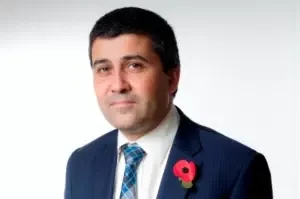FROM one perspective, it could seem difficult to find another major democracy that is quite as relaxed about the role of religious faith in public life as Britain is today. As Eid this week brought the month of Ramadan to a close for several million British Muslims, it will provide the latest occasion for the familiar ritual of political leaders sending warm greetings to the followers of each faith as they mark the special days of their religion. That long-standing tradition continues with the twist of a more diverse cast.
It is now a Hindu prime minister in Downing Street who tweets about what the sacrifice of Jesus Christ means to Christians, while the Muslim mayor of London, Sadiq Khan and first minister of Scotland, Humza Yousaf, host multi-faith iftars to break their own Ramadan fast while recognising Hindu and Christian festivals.

These exchanges of faithful civilities capture our settled consensus on some foundational questions. Public life is certainly open to those of all faiths and none who will champion British values of the freedom of religious expression, and mutual respect for belief and non-belief.
Yet the question of faith in British society often feels unsettled too. The coincidence of Ramadan and Easter this year generated some vocal grievances about the public visibility of Islam. The GB News channel seemed to spend much of the Easter weekend complaining about too much recognition of Islam in a country with a Christian heritage – overlooking the BBC’s usual extensive programming of Christian services, songs and faith discussions – yet, did not seem to give any of its own airtime to discussing the Christian tradition itself rather than grievances about it being neglected by others.
Jews in Britain have faced rising antisemitism in recent months. Many Muslims experienced both solidarity and isolation during Ramadan this year. Iftar meals to break the fast have been held in a wider range of settings this year than ever before – from prominent football stadiums to synagogues, churches and workplaces. Imam Qari Asim of Leeds Makkah Mosque spoke of how heavily the loss of life in Gaza is weighing on the minds of his congregants: “For many, our own fleeting hunger pangs have been a reminder of the starving adults and children we can see on our screens, as we pray for their suffering to be alleviated”.
Julie Siddiqi of Together for Humanity told me that both Jews and Muslims have been feeling increasingly isolated and under pressure since the Middle East conflict escalated, sometimes in different ways: “Never in 25 years of community organising and interfaith work have I seen something happening abroad have such a huge impact on communities and individuals here.”
A recent headline-grabbing opinion poll, conducted by JL Partners for the Henry Jackson Society, contained worrying findings. Four out of ten Muslim respondents said they did not believe Hamas committed atrocities on October 7. Just three per cent of Muslim respondents sympathised with Daesh (Islamic State group), but attitudes to Hamas were much more ambivalent. Over a quarter (29 per cent) expressed sympathy. Yet having uncovered genuinely troubling levels of sympathy and fence-sitting, this survey appeared designed to spin-up support for Hamas as high as it could. Asking respondents to choose between Hamas and Israel – mirroring the framing a pro-Islamist propagandist would choose – doubled general public support for Hamas, to generate sensationalised headlines claiming that almost half of British Muslims, rather than a quarter, sympathise with Hamas.
So the survey design exemplifies why the Henry Jackson Society’s track record has left the pressure group with negligible trust across British Muslim civic society. The non-Muslim general public were asked about perceptions of anti-Muslim prejudice since October 7, but an editorial choice was made not to ask Muslim respondents anything about that. Instead, priority was given to asking them about outlawing homosexuality, making halal compulsory and even making Islam our state religion. If the full poll script reads like a long fishing trip to exaggerate differences between Muslims and their fellow citizens, sometimes bordering on trolling, it frequently failed to land what it was casting its net for. Removing the Established Church appeals to 18 per cent of the public and just 14 per cent of the Muslim respondents, for example.
If this Henry Jackson Society poll was an active demonstration of how to frame an argument to inflate support for Hamas in polarised times, its results offer insights for counter-extremism voices who want to marginalise extreme narratives, rather than boost them. Rejecting that binary frame, separating the cause of Palestine from Hamas and showing how one can recognise both the horrors of October 7 and of the civilian death toll in Gaza, will all matter if we are to get the boundaries right between politics and prejudice. The stakes are high, especially with young people for whom this conflict may be a formative experience. But it is vital for our plural society that we get this right.
